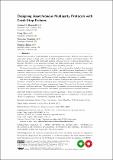Files in this item
Designing asynchronous multiparty protocols with crash-stop failures
Item metadata
| dc.contributor.author | Barwell, Adam David | |
| dc.contributor.author | Hou, Ping | |
| dc.contributor.author | Yoshida, Nobuko | |
| dc.contributor.author | Zhou, Fangyi | |
| dc.date.accessioned | 2023-09-05T12:30:10Z | |
| dc.date.available | 2023-09-05T12:30:10Z | |
| dc.date.issued | 2023-07-11 | |
| dc.identifier | 285672132 | |
| dc.identifier | 270b657d-5a67-457d-bd92-d3659d80ccfd | |
| dc.identifier | 85168885904 | |
| dc.identifier.citation | Barwell , A D , Hou , P , Yoshida , N & Zhou , F 2023 , ' Designing asynchronous multiparty protocols with crash-stop failures ' , Paper presented at 37th European Conference on Object-Oriented Programming , Seattle , United States , 17/07/23 - 21/07/23 pp. 1:1-1:30 . https://doi.org/10.4230/LIPIcs.ECOOP.2023.1 | en |
| dc.identifier.citation | conference | en |
| dc.identifier.other | ORCID: /0000-0003-1236-7160/work/140830275 | |
| dc.identifier.uri | https://hdl.handle.net/10023/28316 | |
| dc.description | Funding: Funding The work is supported by EPSRC EP/T006544/2, EP/K011715/1, EP/K034413/1, EP/L00058X/1, EP/N027833/2, EP/N028201/1, EP/T014709/2, EP/V000462/1, EP/X015955/1, NCSS/EPSRC VeTSS, and Horizon EU TaRDIS 101093006. | en |
| dc.description.abstract | Session types provide a typing discipline for message-passing systems. However, most session type approaches assume an ideal world: one in which everything is reliable and without failures. Yet this is in stark contrast with distributed systems in the real world. To address this limitation, we introduce Teatrino, a code generation toolchain that utilises asynchronous multiparty session types (MPST) with crash-stop semantics to support failure handling protocols. We augment asynchronous MPST and processes with crash handling branches. Our approach requires no user-level syntax extensions for global types and features a formalisation of global semantics, which captures complex behaviours induced by crashed/crash handling processes. The sound and complete correspondence between global and local type semantics guarantees deadlock-freedom, protocol conformance, and liveness of typed processes in the presence of crashes. Our theory is implemented in the toolchain Teatrino, which provides correctness by construction. Teatrino extends the Scribble multiparty protocol language to generate protocol-conforming Scala code, using the Effpi concurrent programming library. In Teatrino, both Scribble and Effpi are extended to support crash-stop behaviour. We demonstrate the feasibility of our methodology and evaluate Teatrino with examples extended from both session type and distributed systems literature. | |
| dc.format.extent | 30 | |
| dc.format.extent | 1333851 | |
| dc.language.iso | eng | |
| dc.relation.ispartof | en | |
| dc.subject | Session types | en |
| dc.subject | Concurrency | en |
| dc.subject | Failure handling | en |
| dc.subject | Code generation | en |
| dc.subject | Scala | en |
| dc.subject | QA75 Electronic computers. Computer science | en |
| dc.subject | QA76 Computer software | en |
| dc.subject | DAS | en |
| dc.subject.lcc | QA75 | en |
| dc.subject.lcc | QA76 | en |
| dc.title | Designing asynchronous multiparty protocols with crash-stop failures | en |
| dc.type | Conference paper | en |
| dc.contributor.institution | University of St Andrews. School of Computer Science | en |
| dc.identifier.doi | 10.4230/LIPIcs.ECOOP.2023.1 | |
| dc.description.status | Peer reviewed | en |
| dc.identifier.url | https://drops.dagstuhl.de/opus/institut_lipics.php | en |
This item appears in the following Collection(s)
Items in the St Andrews Research Repository are protected by copyright, with all rights reserved, unless otherwise indicated.

